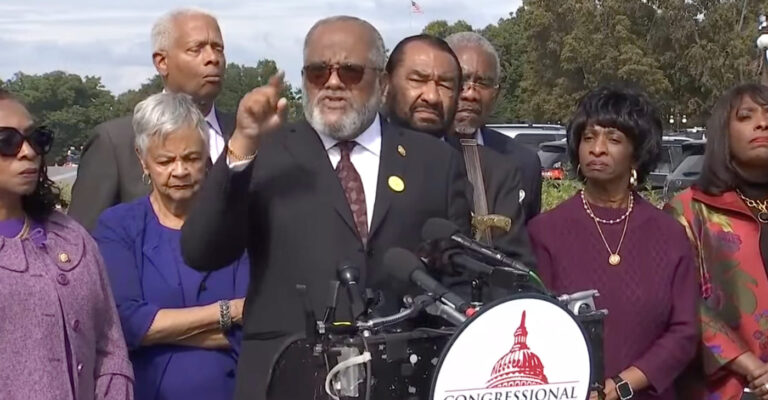By Lauren V. Burke
Today, the Supreme Court began oral arguments in the voting rights case of Louisiana v. Callais, a legal challenge to Louisiana’s congressional redistricting maps. Given the Court’s supermajority of Republican-appointed justices, Section 2 of the Voting Rights Act is now in jeopardy.
Seven Congressional Black Caucus members joined Chair Yvette Clarke (D-NY) on the steps of the Court to stress the significance of the case.
“We are standing on the precipice of what could be a substantial blow to one of the most important civil rights laws in our nation’s history, for every step we take toward building a more and just and inclusive democracy, there are those hell bent on dragging us two steps backward.”
Louisiana v. Callais focuses on Louisiana’s latest congressional redistricting plan. The plan created a second majority-Black district after a lower court found the previous map violated the Voting Rights Act. A group of white voters challenged the map, accusing Louisiana of racial gerrymandering. The case pits the protection of Black voting power under Section 2 against constitutional limits on race-based decisions. If the challengers succeed, the outcome could reshape the balance between civil rights enforcement and equal protection in US elections.
Section 2 of the Voting Rights Act of 1965 is one of the most critical provisions in US voting rights law. It prohibits any state or local government from implementing voting practices or procedures that discriminate on the basis of race, color, or membership in a language minority group.
Unlike other sections of the Act, Section 2 applies nationwide and is permanent, meaning it does not require periodic renewal by Congress. For decades, Section 2 has been a critical tool for challenging laws and redistricting plans that seek to dilute the voting power of minority voters.
Signed into law by President Lyndon B. Johnson on August 6, 1965, at the height of the civil rights movement, the Voting Rights Act was a direct response to decades of racial discrimination in voting, particularly in the South. Literacy tests, poll taxes, and absurdly arbitrary questions, like guessing the number of jellybeans in a jar, were used to block Black voters from the ballot box. Section 2 continues to play a vital role today in protecting the fundamental right to vote in the US by ensuring equal access to the democratic process for all Americans.
Meanwhile, President Trump is now positioning himself to gain control of voting procedures in the United States, having repeatedly and falsely claimed that elections he does not like were “stolen,” as Black and brown Americans gain more political power. Republicans in Texas, where Hispanics now outnumber white citizens, are attempting to change the rules to hold onto power. Hispanic Texans are now the largest demographic group in the state, making up 40.2 percent of the population. The non-Hispanic white population in Texas is at 39.8 percent.
The Congressional Black Caucus now has over 60 members, many of whom represent majority-white districts. The increasing level of power has not gone unnoticed by MAGA Republicans or President Trump.
“Let me be clear, this case threatens to dismantle one of the last remaining safeguards against racial discrimination in our electoral system. And the stakes could not be higher.” CBC Chair Clarke
Lauren Victoria Burke is an independent investigative journalist and the founder of Black Virginia News. She is a political analyst who appears on #RolandMartinUnfiltered and hosts the show LAUREN LIVE on YouTube @LaurenVictoriaBurke. She can be contacted at LBurke007@gmail.com and on X @LVBurke







